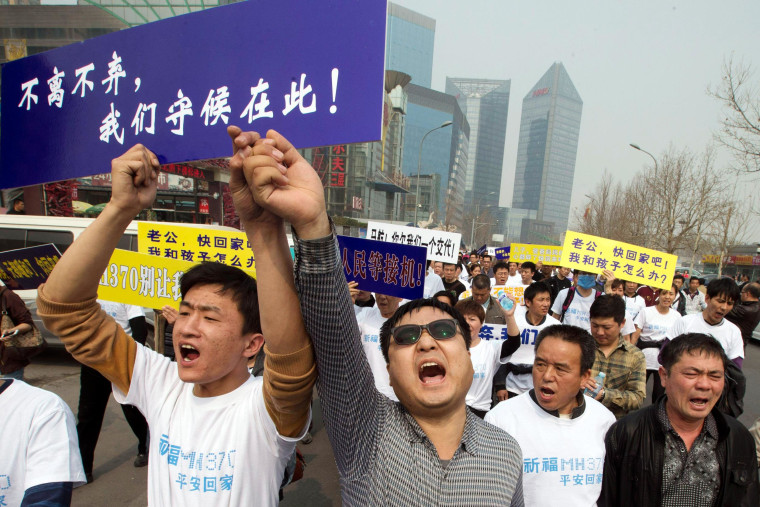The unprecedented two-and-a-half-week mystery surrounding the fate of Flight MH370 has worsened the anguish among relatives of the 227 passengers on board. But the extraordinary anger and distrust among Chinese families may seem puzzling to observers in the West.
At the daily news briefings in Beijing, Malaysian authorities have been accused repeatedly of withholding information about the investigation — even of organizing an international cover-up to mask secret hostage negotiations.
When Malaysia’s prime minister publicly announced what many have privately guessed from the start — that the Boeing 777 had crashed into the sea with no survivors — families demanded evidence and marched angrily on the Malaysian embassy, pelting the building with water bottles.
“Where is the proof?” one relative asked NBC News. “We demand that they continue the search and we demand the truth.”

Some of that distrust is the inevitable consequence of life in a country where a lot of information given by government officials and media sources cannot be trusted.
“Chinese media is highly controlled and much of the information that is given out is done so by the government for government purposes,” said Rod Wye, associate fellow with the Asia Program at London-based think tank, Chatham House. “People are increasingly aware of that and tend to regard official pronouncements with a great deal of skepticism.”
In particular, China's handling of big events such as the SARS outbreak and the 2011 Wenzhou high-speed train crash have put a huge dent in the credibility of the ruling Communist Party and have most certainly colored people’s impressions of how governments act.
That was witnessed first hand by Sarah Bajc, the American girlfriend of Philip Wood, one of the missing MH370 passengers, who on Friday explained how deep-seated mistrust of official pronouncements had added to the distress of the Chinese relatives.
Speaking to TODAY from Beijing, she expressed sympathy for other relatives, “especially the ones here in China who basically hear nothing because the news is all so filtered for them … and they’re crammed together in this hotel.”
“My heart totally goes out to a lot of these families. I get ample access to good information and I am in high stress."
That view was echoed by Wye, who said the emotional response had been exacerbated because the Chinese families have been trapped together “in a hothouse.”
The rise of social media has further exposed China’s disconnect between truth and officialdom. Communist Party propaganda has not kept up with the increasing media savvy of Chinese society.
Despite serious restrictions placed on online freedoms since Xi Jinping came to power, the thriving social media sphere and citizen journalism has increased awareness of governmental incompetence or cover-ups.
Distrust in official information also allows myth and misinformation to gain credence not always afforded in the West. Many rumors that pop up on Chinese social media can often take on a life of their own, no matter how preposterous. Against this background, the remarkable and extraordinary twists in the investigation into what happened to MH370 have convinced many Chinese families that none of what they are told is true.
That the Chinese passengers on the plane had enough personal wealth to travel abroad suggests they were from China’s burgeoning middle class and thus are even more aware of the importance of having their voice heard and kept in the media spotlight, for at least as long as the government may tolerate it.
"People .. tend to regard official pronouncements with a great deal of skepticism.”
In recent years, China has attempted to respond to self-inflicted wounds against its credibility by reporting promptly on incidents, albeit with its own spin on events. In particular, coverage of attacks in Xinjiang over the years and the recent large-scale anti-corruption campaign launched by the Xi administration was aimed at pre-empting public anger.
More than ever, the Malaysian investigators are under pressure to find the tangible evidence of a crash so that families of those on board MH370 may begin to properly grieve.